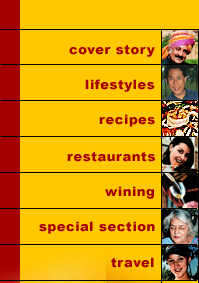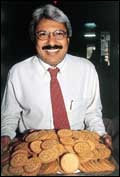


 Guest For Tea, Bring Out Marie!
Guest For Tea, Bring Out Marie!What happens when SUNIL ALAGH, managing director and CEO of Britannia, meets FARZANA CONTRACTOR for business over tea? He calls for everybody�s favourite teatime snack - Britannia Marie! |
|
IF you know Sunil Alagh, you won't be surprised that he suggested Kayani Restaurant & Bakery at Dhobitalao in Bombay as the venue for our meeting over tea. Any other corporate chief would have suggested Sea Lounge at the Taj. But not Sunil. He is a fun person. And a five-star coffee shop would have been too formal for his style. So he hijacked our business meeting to the closest Irani restaurant in town! I didn't mind. I hadn't been to Kayani in years. And I was looking forward to its mutton pattices and cold cherry custard. Also its paani-kam chai.
But, again, with Sunil, you just can't plan these kind of things. He rolled up to Kayani in a Mercedes and bounded into the restaurant, coat slung casually over the shoulder. "What's this? What's this? Custard and pattices for tea! What happened to good, old Marie? Chalo, Britannia Marie biscuits le aao," he ordered the old Irani retainers. And beaming at me, the managing director and chief executive officer of Britannia Industries Limited said: "Marie is everybody's favourite teatime biscuit. It is ideal to dunk into tea!"
I didn't disagree for the simple reason that I am fond of Marie too. I like this no-frills biscuit with its semi-sweet taste and delicate flavour. I also believe it is the perfect complement to tea. "What does Marie mean," I asked Sunil. "Was she the biscuit technologist who discovered this hard dough treat?" "Marie doesn't mean anything," he replied, "This is one of our oldest products, the pride of Britannia's brand portfolio, perhaps it is named after some English lady who served it first. Marie's been around since 1920, so it is very obviously an English biscuit. I'm presuming the recipe was worked out by a lady called Marie."
There was an interruption. Kayani, unfortunately, did not have all the Marie biscuits Sunil wanted. The waiters opened tin after tin, but there wasn't enough to fill a plate. Apologetically, they offered us nankhatai and khari biscuits with our tea. Or mawa cake. Sunil fished out a cell phone and got the Britannia area sales manager, Sajan Tahilramani, on the line. A short while later, as our second round of paani-kam chai was being poured, somebody plonked a small mountain of Marie biscuits onto the table. "There," said Sunil expansively, "even if there's just one guest for tea, bring out Marie!"
Business forgotten, Sunil gave me a sales talk on Marie instead. The biscuit was structured so that it didn't crumble when dipped into tea. The tea softened the biscuit and added to its taste. Or, rather, the biscuit added to the tea's taste. "As a tea-time snack, is Marie more popular than Parle's Gluco biscuits," I asked rashly. Sunil looked at me severely. "There is no comparison. Not in taste. Not in sales.
Though Gluco is one fine biscuit as well. But there's always competetion from other 'Me-Too Maries'. Parle's and Bakeman's. That's why we came up with the 'Guests for tea, bring out Marie!' advertising campaign." I remembered it well. Appearing regularly on prime time television and featuring, I think, the cute Jalal Agha, the slickly made commercial drove home the message that Marie was the ideal biscuit to serve guests at tea-time instead of the usual repertoire of snacks. It sent all "Me-Too Maries" packing.
Britannia gave the biscuit a further thrust by improving its brand equity and quality, making it impossible for immitations to survive. It re-launched Marie as MarieGold. The manufacturing process was modified to a new "crisp bake" process. This made the biscuit bigger, crisper, and even milkier, but kept its delicate taste and flavour.
It even got an improved surface finish and was overall 10 per cent lighter. Finally, incorporating a tea-pot mnemonic on the biscuit, Britannia redefined, and repositioned, MarieGold as the biscuit that was ideal for family get-togethers at tea-times and social occasions. "Did the strategy work," I asked Sunil. "Work! MarieGold is now the best-selling tea-time biscuit," he exclaimed.
Britannia has factories in Bombay, Delhi, Calcutta and Chennai that bake MarieGold biscuits. In also contracts several privately-owned bakers to make the biscuit for it. MarieGold is always in demand. It is exported to the Middle East where homesick Indians include it on their shopping lists and pick it up from supermarkets and food stores. "What is the biscuit's secret," I asked Sunil. "You mean recipe," he countered.
"Nobody knows the complete procedure. But I can assure you, MarieGold will taste the same anywhere you buy it in India. Consistency, that's the secret of its success." It was true. On his travels, Sunil often stopped at small restaurants to see what truckers were having with their tea. If MarieGold was not available to them, he was disappointed. Later, somebody in Britannia would have hell to pay!
The biscuit had undergone one more evolution in keeping with times, he said. There is an entire young generation that takes a coffee break at 11 o'clock in the morning after a hectic start to their day. Their energy levels are low and they look for pick-me-ups. Enter Vita MarieGold in a bright red pack! "This is for those who live in the fast lane and are constantly in a race against time to do more," Sunil snapped his fingers.
"Vita MarieGold is packed with a hell of a lot of energy! It contains 58 per cent cereals and 10 per cent vitamins. A 100 gm packet is enriched with as much protein as a glass of milk. With Vita MarieGold, Britannia is expanding beyond taste. And you can feel the difference! This biscuit is flying!"
"What about you," I asked the effervescent Biscuit King. "What's the secret of your energy? Are you also a MarieGold man?" And Sunil Alagh replied, "I am... an asli Marie biscuit man. Breakfast is bed tea and two MarieGold biscuits. Plus a glass of juice. There is nothing between breakfast and lunch. And lunch is five Vita MarieGold biscuits with a cup of coffee. I eat nothing else till dinner. Over dinner, I go haywire!
Especially over the weekends. You name it, I eat everything. But on a day-to-day basis, it is Vita MariaGold that sustains me. You know what the ads say? Dip karo, zabardast energy!" And he went away leaving me to settle our chai bill of 18 rupees with Kayani and wondering what to do with the small mountain of our favourite biscuits on the table.
|

Home Page
About the mag
Subscribe
Advertise
Contact Us
